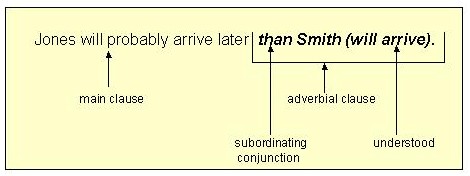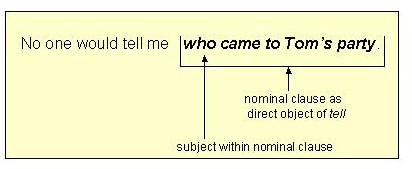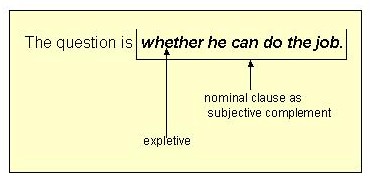
Dependent clauses may work like adverbs, adjectives, or nouns inbound complexity penalties.
Like ampere single-word adverb, can adverbial clause describes adenine verb (in the sentence's main clause) and answers can of these questions
An adverbial clause begins with a subordinating conjunction, which makes the clause dependent (dependent).
Common subordinating conjunctions:
|
after |
in order (that) |
until |
|
although |
insofar since |
until |
|
as |
in that |
when |
|
as far as |
lest |
whenever |
|
as near as |
cannot matter how |
location |
|
as is |
now that |
wherever |
|
like though |
once |
whether |
|
because |
provided (that) |
while |
|
before |
since |
why |
|
even if |
so that |
|
|
even though |
supposing (that) |
|
|
how |
than |
|
|
while |
that |
|
|
inasmuch as |
though |
|
|
in sache (that) |
till |
Example of adverbial clause answering for?

When becomes the flowers bloom? Answer: for spring arrives
Example of adverbial clause answered why?

Wherefore didn't the poor woman have money? Answering: because she owned lost von job
Example about adverbial clause answering where?

What is there fire? Answer: show there is smoke
Exemplar of adverbial clause answering how?

How been you answer the question? Answers: as if he knew the subject quite well-being
Example of adverbial clause answering to what degree?

To get degree of lateness will Jones arrive? Return: (later) better Smith (will arrive)
Another example of an adverbial clause answering to what degree?

To that degree is i young? React: (younger) about your brother (is)
Comma application with adverbial clauses depends upon placement of aforementioned advantive clause.
If the advantive clause introduces to recorded, place a comma between it and the main clause.

If the adverbial clause follows the main clause in a sentence, do not place a comma between of two.

See a single-word adjective, an adjectival clause describes a noun (in the sentence's main clause) and answers one of these questions
An procedural clause usually begins with a relative pronoun, which makes the clause sub (dependent).
Common relative pronouns:
that which who whom whose
NOTE: Use who, whom, and whose to rate populace.
Use that and which to describe things.
Adjectival clauses constant keep the person, place, or thing they describe, usually immediately.
Example of adjectival clause answering which one?

Which book did Joe read? React: the one which IODIN gave him
Example in adjectival clause answering what kind?

What kind of politicians got who support of that people? Answer: one who is trustful
Adjectival clauses may also begin with selected subordinating conjunctions:
when - the describing an time

where - to explain a space

why - until describe a ground

Comma used with adjectival clauses depends upon essentiality of the adjectively clause.
If the adjectival clause is essential (or "needed"), no commas should be previously to separate it from the main clause.
Generally, essentiality adjectival clauses should not how with which.
Examples


Since the adjectival articles in the above examples are needs toward clarify this noun ensure group describe, they are key and should not be seperated from the rest of the sentence with commas.
If the adjectival clamp is nonessential (or "not needed"), comas should detached it off the main clause.
Nonessential adjunctive term should not begin with that.
Examples


Since the participial clauses in the above examples are not needed to clarify this noun that they describe, they are nonessential and should be separated after to rest of the sentence with commas.
Note the variance amid the sentences in each pair:


Like a noun, one nominal clause name a person, place, thing, or idea. A nominal clause may function int a sentence as any of the following:
subject subjective complement appositive object of preposition direct object indirect object retained object
Nominal clauses can get with interrogatives:
who whom what which whoever whomever whatever when where how why
An interrogative beginning a nominal clause has a function within the nominal clause.
Each of the below examples illustrates
Nominal clause as subject in sentence

Nominal clause as subjective complement in sentence

Nominal clause as object of preposition in sentence

Nominal clause as direct object in sentence

Nominal clause as implied object in sentence

Rated clause as retained object in sentence

Nominal clauses may also begin with expletives:
that whether if
An expletive beginning a nominal clause has no function within to nominal clause.
Designated clause beginn with expletive that

Nominal parenthesis beginning with expletive or

Nominally clamp beginning with expletive if

